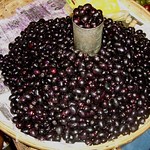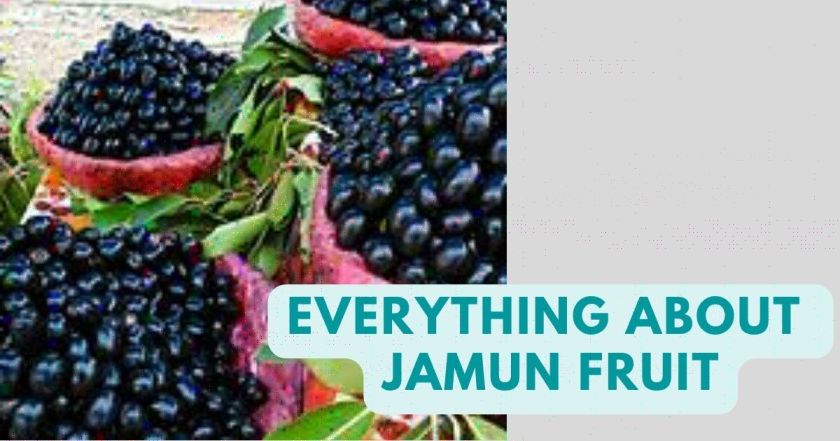Jamun in English
- English name of Jamun fruit is “Java plum / Black plum / Malabar plum / Jambolan”
BUY JAMUN JUICE ONLINE
Jamun in Tamil
- Jamun meaning in Tamil is “Naval palam”
Jamun in Malayalam
- Malayalam name of Jamun is “Njaval pazham”
Jamun in Telugu
- Telugu name of Jamun is “Neredu”
Jamun in Kannada
- Kannada name of Jamun is “Nerale Hannu”
BUY JAMUN JUICE POWDER ONLINE
Jamun in Gujarati
- Gujarati name of Jamun is “Jambu”
Jamun in Marathi
- Marathi name of Jamun is “Jambhul”

Jamun Fruit / Java Plum / Black Plum
The jamun fruit (scientific name: Syzygium cumini), also known as the Black plum, belongs to the family Myrtaceae and Syzygium genus. Also known by many names like Java plum, Malabar plum or Jambolan. The plant can be found in Asia, especially India, and is popular for its delicious flavor and health benefits, including antioxidant properties that lower blood pressure and cholesterol levels.
Jamun fruit belongs to the same family as mangoes, feijoas, and guavas and is found in India, Bangladesh, Pakistan, Sri Lanka, Vietnam, and other countries in Southeast Asia. Jamun gets its name from its dark-purple color that resembles a dark rain cloud (Jamun means dark cloud in Hindi). Although it can be eaten fresh or dried up to make jams or preserves, jamun fruit has also long been used for medicinal purposes in both Eastern and Western medicine. This article provides an overview of everything you need to know about jamun and its health benefits.
If you’re looking to add more natural antioxidants to your diet and improve your cardiovascular health, then jamun fruit might be the best way to do it. There are many reasons to love the jamun, but perhaps the most important is its multitude of health benefits. This little fruit’s use in traditional medicine dates back thousands of years, but it has not yet gained popularity in Western countries as other fruits have. Now more than ever, though, there’s reason to try it out—it can help with everything from weight loss to vision problems!
Java plum have been consumed by various cultures all over the world since ancient times, and they have been used medicinally as well. Jamun fruit is one of the many fruit trees in the Philippines, and it’s also known as the wild tamarind or camias in other countries such as Indonesia and Malaysia, where it originated from. However, this tree doesn’t only grow in those countries, but it can be found in tropical parts of Asia, Africa, Central America, South America, and the Caribbean Islands as well.
Jamun Benefits
Jamun has several potential benefits. For example, research has shown that it can help lower LDL cholesterol levels and high blood pressure. It may also have anti-diabetic effects and anti-inflammatory effects in some individuals. In addition, it contains phytochemicals with antioxidant properties, which are linked to cancer prevention. What is clear is that jamun fruit contains antioxidants, which are great for overall wellness, as they protect cells from free radical damage caused by oxidative stress.
Jamun known as Java plum in English, also known as Java apple or langsat, is native to Southeast Asia, but it can now be found in other tropical climates such as Australia and Hawaii. It’s frequently used in desserts because of its sweet taste and high levels of vitamin C and B vitamins. But that’s not all — the Java plum has many other health benefits, ranging from boosting your immune system to reducing stress. If you’re looking for something tasty to eat, why not give this fruit a try?
Jamun is one of India’s favorite fruits. The fruit has been used medicinally in Ayurvedic medicine for centuries, and it grows natively throughout South Asia. In fact, its medicinal uses are so well-known that its Sanskrit name—Amla—means the great medicine! It is helping to lower high blood pressure, manage type 2 diabetes, and improve liver health. It’s also rich in fiber, which means it helps regulate your digestive system. Java plums also contain anti-inflammatory properties, making them ideal for anyone suffering from arthritis or rheumatism. These plums should be eaten fresh; they don’t store well once picked and won’t last long after being picked from their tree. They make a tasty addition to salads or desserts, but taste best when enjoyed fresh off the tree with some plain yogurt or chai tea.
Jamun Fruit Health Benefits
Jamun fruit contains lots of essential vitamins, antioxidants and dietary fiber that support heart health. It is also good for your bones, immune system and respiratory system. The fruit tastes sweet and has plenty of minerals that help strengthen teeth. You can add Jamun to your diet to improve your overall health. Jamun fruits are high in vitamin C, providing about 18 percent of your daily value per 100 grams (3.5 ounces). Vitamin C helps you fight off colds and flu by boosting your immune system. A study published in 2007 in Lipids found that adults who consumed foods rich in vitamin C had better blood flow than those who didn’t get enough vitamin C from their diets. Jamun are also a good source of potassium (1 percent DV per 100 grams) and copper (7 percent DV per 100 grams). Both nutrients play important roles in heart health by lowering blood pressure and helping maintain healthy cholesterol levels. Your body needs copper to make red blood cells, which carry oxygen throughout your body.
In Ayurvedic medicine, jamun fruit is believed to alleviate skin disorders, such as psoriasis, dermatitis, etc. For curing a sore throat, take a small piece of raw jamun fruit in half cup water. Drink it several times a day. The gelatinous substance that oozes out while eating jamuns is one of its active constituents and helps cure stomach disorders. It also soothes indigestion. Regular consumption of jamun has been found to promote lactation in breast-feeding women.
What does Jamun taste like?
Jamun taste like a combination of sweet, sour and tart. It’s not necessarily something you’d want to chomp on whole, but it can make for one great fruit drink. So here are some Jamun benefits from throughout history and around today that you can try out if you happen to come across one of these super-fruits. Jamun are best eaten fresh, so look for them at farmers markets or buy them directly from local farmers when they’re in season.
When Can You Eat Jamun?
Jamun should be ready to eat by mid-August through early September. However, because they taste better after being left on trees longer than most other fruits, you might find them available later into fall as well.
How Can You Store Jamun?
Jamun should be stored in a cool, dry place with good air circulation. They don’t need to be refrigerated until they are ripe and ready to eat. Once you cut them open, however, you should store them in an airtight container in your refrigerator for up to five days. If you freeze them whole, they will keep for up to six months.
How can I use Jamun in my daily diet?
Though it is not as widely known as other fruits, jamun is quite similar in its nutritional values. A 100 g of raw fruit has around 15.3 g of carbohydrates, which is equal to a banana. It also has small quantities of protein (1.2 g), fat (0.2 g) and water (84%). The fruit also contains vitamin C (68 mg), thiamine (0.08 mg) and riboflavin (0.03 mg). In addition, there are trace amounts of potassium, iron, magnesium, copper, zinc and manganese present in jamun fruit as well. But make sure you consume it after removing its seeds because they can cause irritation in your throat if swallowed whole or uncooked while processing through your digestive system!
Is Jamun good for skin care?
Jamun has a range of uses, including as a herbal remedy for various ailments. As a skin care ingredient, it is used in cosmetic products and topical applications. Studies have shown that jamun contains antioxidant properties that help fight free radicals. A study published in Phytotherapy Research showed that extract from jamun fruit has high antifungal activity against dermatophytes like Trichophyton mentagrophytes, Trichophyton rubrum and Microsporum gypseum. It can be used for treating conditions like eczema, psoriasis, boils, warts etc by promoting regeneration of new skin tissue by its inhibitory action on collagenase enzyme.
Jamun fruit for Diabetes
Although several studies have shown that consuming jamun fruit regularly can significantly lower blood sugar levels in people with type 2 diabetes, more research is needed to confirm these results. Additionally, if you have diabetes, it’s crucial to get your disease under control before adding jamun fruit into your diet. This will help ensure you don’t experience any dangerous effects from consuming too much sugar or altering your treatment plan. It is best to avoid jamun fruit if you are pregnant. Although not enough is known about its potential effects on unborn babies, it would be best not to take any chances until further research has been conducted. Also, it’s important not to overdo it when eating jamun fruits; moderation is key!








